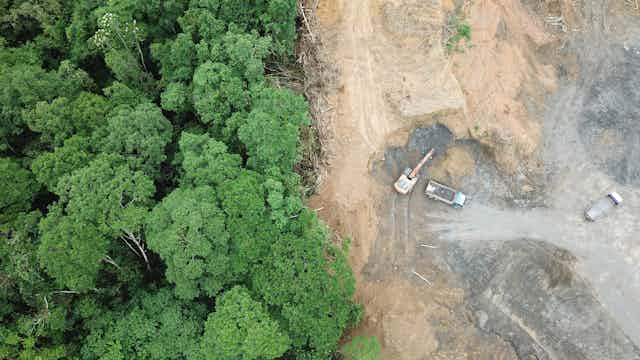Big corporations could drive a worldwide shift towards more sustainable supply chains that limit damage caused by deforestation. But progress is being slowed down by weak or non-existent commitments to ensure that supply chains for commodities such as soy, palm oil and beef have not contributed to tropical deforestation, according to analysis recently published by the environmental organisation Global Canopy.
Based on ten years of data, the Forest 500 report assessed 350 companies, from high-street supermarkets and food producers that might use soy or beef in their supply chains to firms using tropical timber to build furniture. It also looked at 150 financial institutions that provide US$6.1 trillion (£4.8 trillion) of investment to these companies each year.
Nearly one-third of the assessed companies still haven’t committed to avoiding deforestation when trading in commodities such as beef and leather, palm oil, soy, timber and paper pulp.
But progress varies depending on the product. While a majority (76%) of companies assessed for palm oil have a deforestation commitment, 65% of those assessed for beef do not. Conversion to beef pasture is driving a surge in deforestation in Brazil’s Cerrado savannah where, last year, deforestation increased by 43%.
New laws, such as the EU Deforestation Regulation and US Forest Act, aim to prevent trade in products that contribute to illegal deforestation. But these may not protect habitats such as the Cerrado savannah, for example, which falls out of scope of the new EU regulation because the trees aren’t tall enough to count as forest.
Unless deforestation regulations are strengthened to stop trade in products that have caused the loss of any type of vital natural habitat, companies will not stop trading in products such as beef that are sourced from forests like the Cerrado savannah.
In the UK, proposed regulations will stop trade in products associated with illegal deforestation, but not those defined as legal under local law. Regulation has a part to play in halting deforestation, but only if it includes all conversion of natural habitats, both legal and illegal, and includes regulation of the finance sector.

International collaborations such as the Forest and Climate Leaders Partnership seek to address government and public sector ambition. But steps to reduce deforestation from within the private sector are just as crucial, because global trade in forest commodities drives loss.
The greatest drivers of tropical forest loss are conversion to cropland and pasture, building of infrastructure such as mines and roads, and logging for timber. Climate change and wildfires add further pressures, degrading forests.
Trade in products such as coco, coffee, palm oil, soybeans, beef and leather, timber and wood pulp all expose companies to deforestation risk. The raw trade value of these products – defined as “freight on board” by UN Comm Trade – in 2022 alone was more than US$32 billion.
It’s hard to move away from deforestation to make valuable products when the practices are supported by huge subsidies. Those to the soy, palm oil and beef industries support 14% of annual global forest loss. The annual funding for forests is less than 1% that which funds environmentally harmful subsidies, so progress in reducing deforestation is undermined by an enormous financial gap. This needs to be closed in order to start financially incentivising forest protection.
Human rights issues and deforestation go hand-in-hand because many Indigenous peoples and local communities are denied land rights to their forests. It is vital that companies ensure their supply chains do not exacerbate land rights denial – but here the new report highlights a global blind spot.
Only 1% of Forest 500 companies had a policy for all of the human rights issues relating to at least one of the highest-risk commodities they were assessed for. And most of the companies assessed (91%) did not have a published commitment to ensuring that all rights-based conflicts are resolved before they finalise new developments or acquisitions in their supply chains.
Global forest goals
2023 was a landmark year for the planet’s forests. For the first time, the global goal to halt and reverse deforestation by 2030 was formally adopted by the UN.
Yet despite everything forests do for nature, people and the climate, forest loss continues almost unabated. In 2022, an area of forest the size of Denmark was lost. The new report shows there is still a huge gap between ambition and action.
There is no legally binding international framework convention on forests, so most forest commitments are voluntary. Advice to companies on how to accelerate and scale up deforestation and conversion-free supply chains is widespread, but the Forest 500 assessment concludes that the private sector isn’t taking voluntary action fast enough.
Only 3% of Forest 500 companies are fully and publicly reporting deforestation in their supply chains, and 63% fail to publish adequate evidence of the implementation of their deforestation commitments. This makes it difficult for consumers to be sure that the products they buy are not contributing to any form of forest loss.
As the report concludes, new regulations to address deforestation must be ambitious and cover both legal and illegal deforestation. They must also address the conversion of natural ecosystems for forest commodities that result in environmental destruction, and any associated human rights abuses.

Don’t have time to read about climate change as much as you’d like?
Get a weekly roundup in your inbox instead. Every Wednesday, The Conversation’s environment editor writes Imagine, a short email that goes a little deeper into just one climate issue. Join the 30,000+ readers who’ve subscribed so far.

